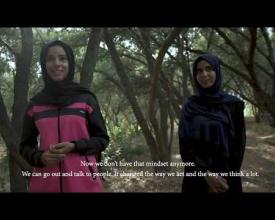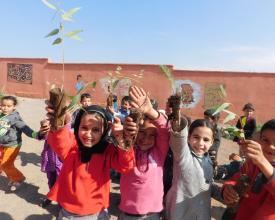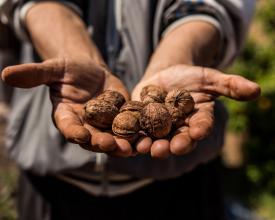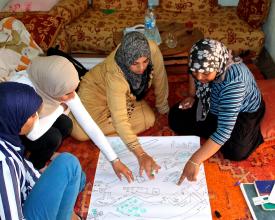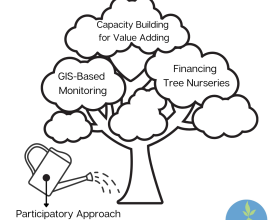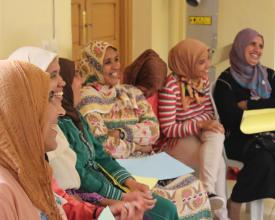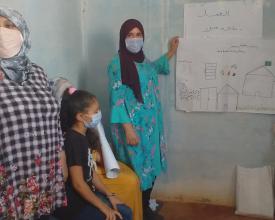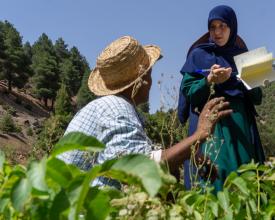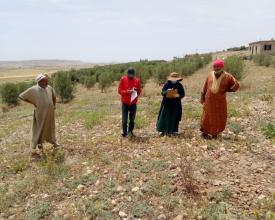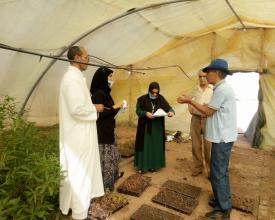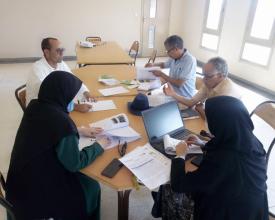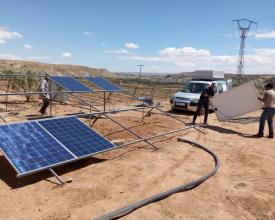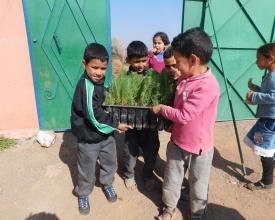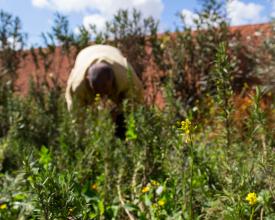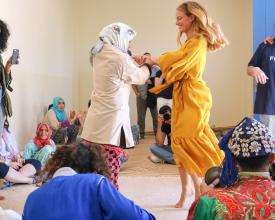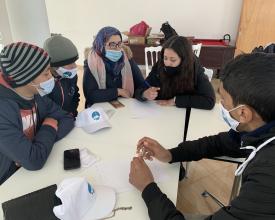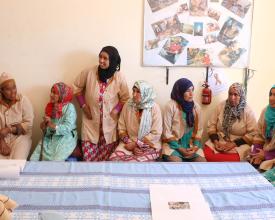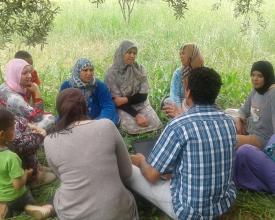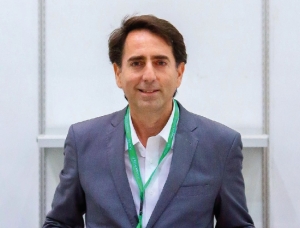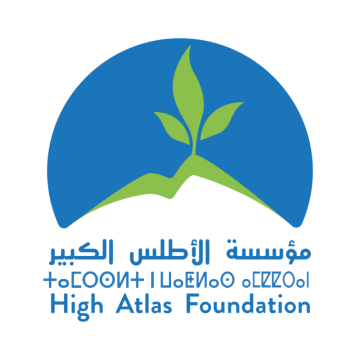
Restoring Morocco's Biodiversity through Agroforestry
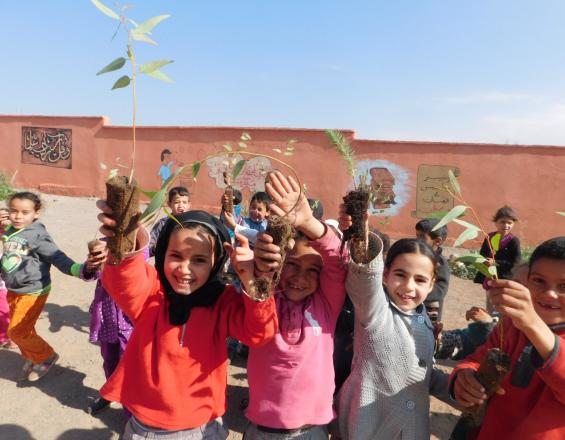
High Atlas Foundation (HAF) and its partners focus on restoring native plants and trees to rehabilitate Moroccan biodiversity. Through agroforestry methods, HAF aims to push back against the effects of climate change, including desertification, irregular rainfall, and rising temperatures. Trees grown in HAF's nurseries are provided to farming families and education centers, who are the sole beneficiaries of the yields. HAF’s tree nursery projects are managed by the people who plant, irrigate, maintain, harvest, and gain income from them. The goal is to integrate communities in land rehabilitation, promote native species and sustainable livelihoods, and systematically monitor trees in the nursery and fields. HAF builds the capacities of agricultural cooperatives and rural people in food safety, financial management, marketing, and the development of agricultural business plans.
Context
Challenges addressed
Native varieties of trees are experiencing a steep decline, and some have gone extinct, threatened by destructive farming practices leading to degraded soils and polluted ecosystems. Morocco’s water supply is rated as extremely high stress. The agricultural sector is by far the largest consumer of water, and this in combination with decreased precipitation trends and higher global temperatures could lead to a massive decline in agricultural productivity. Under the most extreme climate change projections, aggregate agricultural crop production could decline by 15% assuming no adaptation. In addition, the COVID crisis struck small-scale farmers with dramatic declines in revenue due to their dependency on international agrobusiness for providing seeds and fertilizer. Thus, the demand for native fruit trees is very high and rising, as are their prices, making it difficult for farming families to transition from growing staple crops to the more livelihood- enhancing fruit trees.
Location
Process
Summary of the process
Since 2000, HAF has understood that addressing the bottlenecks or the severe challenges along the agricultural value stream was an essential part of overcoming rural poverty. Efforts need to go further, however, in order to address the agricultural difficulties requiring community design and management and benefit. Fruit tree planting and building nurseries has always been a core contribution of HAF to farming communities in response to their most significant requests. These building blocks interact to form a singular process that is based on building trust and mutual respect with all of the various sectors of Moroccan society - from rural farming families, to local and national governments. The participatory approach to project design and management (Building Block #1) is integrated into every activity that HAF conducts, and not only women's empowerment but community empowerment (Building Block #2) is a vital part of that process that enables the success of actvities such as GIS Monitoring (Building Block #3) and Tree Nursery Financing (Building Block #4), and Capacity Building for Value Adding (Building Block #5).
Building Blocks
Participatory Project Approach
In implementing community development projects, particularly those related to the environment, it is vital that local communities are involved as they understand their environment best. The participatory approach encourages close collaboration with civil groups. Heavily focusing on its members’ capacities to be effective managers of change, a more functional and successful solution can be adapted. Through participatory dialogues, technical trainings, and the fostering of partnerships among NGOs, business, and governments — local and national — solutions are generated that cannot be achieved by any of these entities on their own. These dialogues allow the opportunity to collectively assess needs, and identify, design, and implement initiatives.
Enabling factors
Community ownership, as exemplified by their contribution of resources and effort, is our key measure for sustainability and acceptance. This outcome is an extension of the initial empowerment and community-planning sessions. Another highly relevant aspect is coordination and project managerial support that are provided by village-based civil associations and cooperatives. Key to project longevity is the ongoing local and institutional participation during the project’s life.
Lesson learned
By ignoring the concerns of society in relation to the environment, we risk endangering the continuous and reliable provision of the natural resources on which economies depend. When discussing ecosystem-based approaches in the context of sustainable development, the social dimension must be considered. The production and use of natural resources, therefore, must not only take into account society's environmental priorities, but also be organized in a way that supports the social consensus that binds us together. Additionally, when facilitating community dialogues, they must be inclusive of public, private, and civil organizations, which provides information and an essential basis for sustainable decisionmaking. By fostering the inclusive dialogue quality needed for a resilient program and environment, the project will have greater impact.
Women's Empowerment for economic, social and environmental development
HAF has had critical successes in engaging women in the management, monitoring, and institutionalizing processes of sustainable agriculture, overcoming gender barriers as a result. These strategies are vital in order for actual socioeconomic and environmental improvements to take hold. Empowerment outcomes with women’s groups in different regions of Morocco have been enabled by the Imagine workshop, which takes place over four days and 32 hours. These workshops help build the personalized vision of the women participants, provide the setting and coaching in order to analyze social relationships, including familial relationships that may promote and/or need strengthening in order to gain the support needed to achieve greater levels of self-determination and economic benefits. Imagine workshops, however, are not solely for women - men have and will continue to be encouraged to participate in empowerment workshops such as Imagine to support a holistic community empowerment process. As a result of these workshops, beneficiaries often join together to create cooperatives and self-employment initiatives. For example, 178 women now earn income from 13 new cooperatives which operate fruit tree and medicinal plant nurseries, engage in food processing, keep bees, and more.
Enabling factors
The progress of a community is directly correlated with the advancement of women and their capability to participate in economic, social and environmental development. Most women in rural areas have fewer opportunities to participate economically due to the social pressures found within their communities. In order to overcome this boundary, men must be involved in the gender equality process - by including them, they may no longer be barriers to women's financial and emotional independence, but advocates.
Lesson learned
Empowerment workshops such as Imagine can do more harm than good if they are not implemented in the proper way. This means that the program must continue to follow up with participants and provide them with the resouces they need to more effectively act on the goals they identified throughout the course of the workshop. Following the workshops, HAF supports participants in pursuit of self-identified new economic endeavors. Through entrepreneurship and skills development (primarily in the agricultural sector), participants can work collaboratively toward increasing incomes and economic protections for themselves, growing networks which foster continued confidence for economic engagement.
GIS-Based Monitoring
The systematic monitoring of planted trees that is conducted by HAF and the gathering and registering of data of trees planted, including GPS locations, height, diameter, survival rates, and social benefits. The integrated tree monitoring system, called AKVO, was developed by Ecosia, a German organization which plants trees using revenue generated from their search engine. Trained in the use of this application, the monitoring team disperses throughout the regions, visiting the farmers and monitoring the trees that were planted during the previous planting season. Stored in a shared database, the information collected by the team in collaboration with local nursery caretakers will enhance informed decision-making at all levels of governance and across sectors by filling gaps in knowledge and precedence regarding practical application of resource management.
Enabling factors
GIS-based monitoring is enabled primarily through community partnerships. Local residents are able to support the monitoring staff and the massive effort that goes into to the monitoring and data collection process. Without an extensive network across the country, it would not be possible to implement this system.
Lesson learned
As a result of its monitoring actvities, HAF has developed an extensive database on tree survival, growth, and product yield from its fruit tree nurseries across several life zones that, combined with published studies, can develop trends in agriculture products and carbon sequestration by life zone as a function of climate conditions. Additional field work such as analyses of soil samples, measuring growth and precipitation, and doing so in all biozones, is vital in order to develop a database that covers all Morocco toward national impact. In addition, the procedures for analyses and guidelines for determinations in relation to planting, water consumption, impacts on food security, and measured advantages from renewable energy must be specialized.
Financing Tree Nurseries
The trees that HAF with community partners grow from seeds in nurseries in Morocco are generators of direct revenue from the a) sale of the trees at a subsidized rate to farmers, cooperatives, associations, and education centers, and b) voluntary and credited carbon offsets that are secured with HAF’s monitoring system of the trees that are transplanted from the nurseries, integrating and maximizing the benefits from remote sensing and ground-truthing with community engagement. The sale of carbon credits, in particular, ensures maximum impact - revenue generated by the trees planted is reinvested directly into the communities that grow the trees.
Enabling factors
In 2006, HAF established its first community nursery. Since then, HAF has been lent land without cost by the public agencies. HAF first developed regional agreements for land with the Department of Water and Forests, the Ministries of Education and Youth & Sports, universities, the Moroccan Jewish Community, and cooperatives. They are now extending more land to HAF for nurseries. This is key in allowing HAF to provide trees to farmers at subsidized costs so that they may benefit more fully from the future income of the trees they plant.
Lesson learned
By gathering data on social benefits related to trees planted, carbon credits can be sold based on not only the environmental benefits but social impact as well. In addition, trainings in local communities are vital for giving members the tools, resources, and confidence to pursue their goals - which often tend to relate to income generation. However, beyond knowledge and skills-building training, cooperative members need guidance on how to utilize not only already-existing resources but also how to collaborate for shared benefit. Participatory planning meetings allow participants to identify common needs and share experiences. By encouraging members of different cooperatives and commuities within one municipality or province to develop a supportive network through the participatory approach, projects such as tree planting can go further in achieving its objectives.
Capacity Building for Value Adding
HAF is dedicated to the capacity building of community and cooperative members, especially in natural resource management and participatory decision-making among people who understand their local environment best. HAF provides consultancy and capacity-building workshops to achieve value added processing and marketing of agricultural products by the growing communities and their cooperatives. HAF does not control or own the raw or processed products, the farmers do, but this activity is an indirect and significant local income benefit that yields high quality and quantity product standard. Examples include supporting a cooperative in blanching almonds produced by their trees, developing a business plan for value-added walnut processing, and organic certification.
Enabling factors
Moroccan policy such as the COVID-19 economic recovery plan and the Green Plan highlights agricultural development which has encouraged cultivation of unproductive areas. Social conditions and economic opportunities - coupled with a sense of necessity, if not urgency, - are such that Morocco’s agricultural economy has outstanding potential. With strategic local community investments in implementing farm-to-fork initiatives, it can become the financial engine to build capacity in all areas.
Lesson learned
It is essential to address challenges along the value chain facing producers, and to invest in value addition activities in processing and marketing, not just planting trees. By examining the entire value chain and developing a holistic approach to solving problems, HAF and local communities can more effectively increase profit for Moroccan farmers and reduce pressure on landfills.
Impacts
HAF works to promote more sustainable agricultural practices to help people adapt to climate change and improve their livelihoods. Since 2003, HAF planted approximately 4 million fruit trees in 39 provinces of Morocco, impacting 15,000 farming families through sustainable income generation and enhancing more than 650 schools. HAF’s rights-based empowerment workshops, the precursor to many of its projects, have supported over 900 women and girls in 11 regions across Morocco. These workshops have helped women realize their potential and create plans to reach their goals. As a result of these and other capacity building activities, HAF created 16 and strengthened more than 100 cooperatives and associations, particularly with women and youth (reaching two-thirds participation).
Beneficiaries
- Communities of rural farming families;
- Rural women;
- Young women who were unable to continue their schooling;
- At-risk youth;
- Individuals who seek careers in organic agriculture;
- Those who have lost income as a result of the COVID-19 pandemic.
Sustainable Development Goals
Story
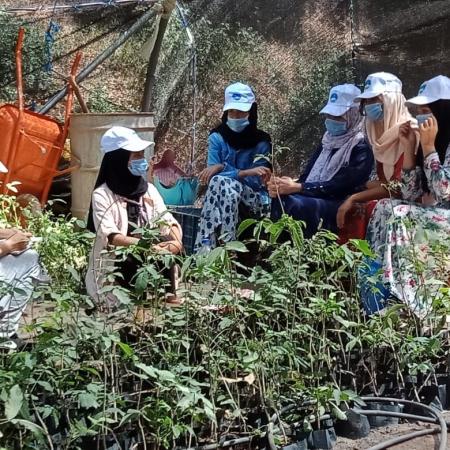
Fourteen women from the Tassa Ouirgane village attended a four-day Imagine Empowerment workshop January 2019 with the High Atlas Foundation (HAF). The purpose of Imagine workshops is to enable women to create the life they most want. It is considered one of the foremost personal growth trainings available. The program focuses on seven areas of life: Emotions, Relationships, Body, Money, Work, Spirituality, and Sexuality.
Below are the testimonials of a girl and a woman, both of whom attended the workshop:
”I’m divorced, and I have a daughter. I live with my father and my mother. I want to work to help my daughter, and I’m afraid to get out of the house because of society’s contempt toward me and their lack of trust. I thank God because my family has helped me a lot, but I wish I could be independent.”
After 4 days of the empowerment training, she confirmed “I will not pay attention to the opinion of others. I will be working toward my vision to be independent, build my own home, and live with my daughter.”
This woman is now the leader of the Takhrkhourt agricultural Cooperative.
“I dropped out of middle school during the last school break. I started training in artisanal craft, but I don’t feel comfortable with the decision that I made, and I don’t know how I can tell my father.”
On the second day of the workshop, she told the other women participants: “I informed my father about how I felt, and he agrees with my decision to return to school.”
One of the results that came from the empowerment workshop and the participatory approach meetings that were conducted afterward with the same women was the vision to create an agricultural cooperative in order to capitalize upon the village’s natural resources. HAF provided them with training on the creation and role of cooperative statutes, democratic voting for decision-making in the cooperative, organizational management, environmental protection, how to plant seeds and cuttings of trees, and how to irrigate trees.
Throughout each training and workshop that the women received in 2019-2020, HAF supported them to create Cooperative Takhrkhourt, an agricultural cooperative whose membership includes one woman and four girls. In 2020 alone, Cooperative Takhrkhourt planted 40,000 olive and walnut trees in a nursery that they manage.

